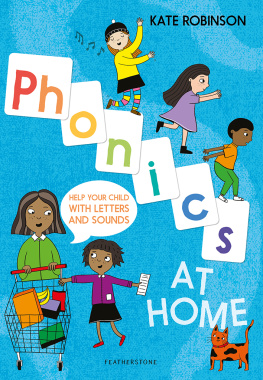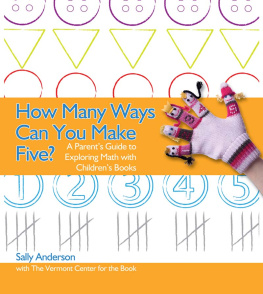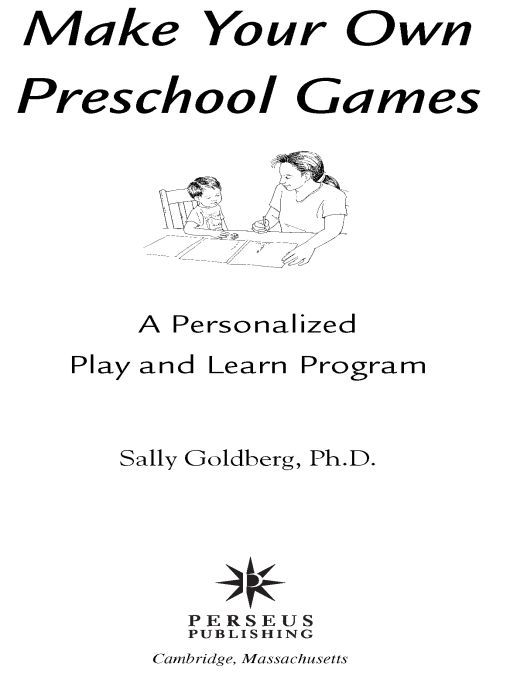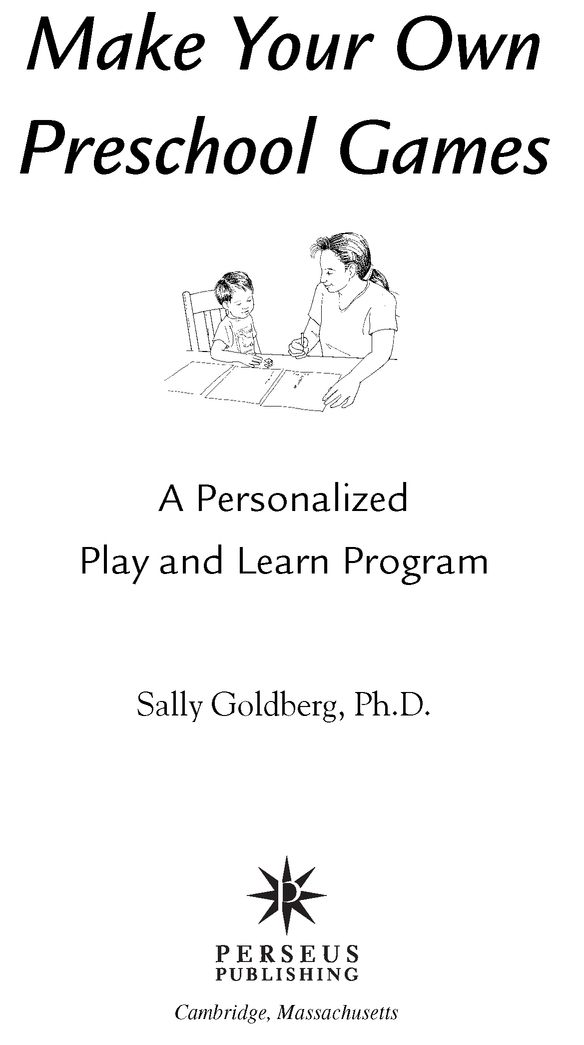Table of Contents
Other Books by Sally Goldberg, Ph.D.
Baby and Toddler Learning Fun
Constructive Parenting
Parenting Involvement Begins at Birth
To my daughters Cynthia and Deborah. Cynthia helped me develop the games. Deborah helped me refine them. Then Cynthia and Deborah grew up to become wonderful young women and great friends to me and to each other.
Foreword
Young children are busy, busy, busy! They are interested in everything around them. Your three, four, or five year old wants to touch everything, explore the surroundings, and investigate the how and why of items in the environment. You have a unique opportunity. Children not only want to please their parents, but use them as a model for everything they do. They mimic and copy your movements. They are interested in the things you find intriguing. This puts families in a special, advantageous position. As you nurture and love your growing child, you also become their first teacher. Dr. Sally Goldberg has taken this benefit and gives you multiple examples of how to expand your childs knowledge while providing that necessary one-on-one time that every child needs.
In the 1990s scientists were able to document what early-care educators have known for decades. The first years are the learning years! Nearly 90 percent of all brain growth occurs in the first five years of life. The quality of the childs environment and the variety of experiences help the child reach full potential. Knowledge is acquired from the interaction of the childs senses with the sights, sounds, and smells in his or her surroundings. Nestled quietly in the research is the role of parents. Adults enhance the experience with descriptive language. They help define the early years. A safe, loving atmosphere helps open the pathways to learning. Children develop their lifelong attitude about learning.
In the book, Make Your Own Preschool Games, Dr. Goldberg gives multiple ideas to help your child grow physically, cognitively, and socially as he acquires language. The most positive outgrowth of this approach is the close relationship you will establish with your child. Spending minutes that focus on your child each day can only be beneficial. This interaction in the early years should translate into an open communication avenue as your child matures. This mutual understanding is the kind that will last through the years. And to think it only takes a small investment of time and materials when your child is young!
How refreshing to know you can make a difference in your childs readiness for formal, academic learning! Imagine how simple it is to gather household items to create learning games. Listening to advertising and marketing hype, we are lulled into thinking expensive, high-technology toys and games are best for educating children; but the flashing lights and battery-powered movement are not as exciting to children as to adults. They quickly lose interest in them. That old adage that children like the boxes better than the contents is often true. Simplicity is often best. Your few minutes playing these games with your child is not only more productive, but is also strengthening the bonds so necessary for self-esteem. You will reap rewards, not just watching the growth, but in the close relationship you establish with your child.
Sitting for hours in front of the television or watching videos is a passive activity. Children cant learn new skills, exercise muscles, or utilize their reasoning power. There is no expansion of communication skills. Selecting a game and playing directly with their parent is a better choice.
Young children are never bored. This is an adult concept. When children tire of an activity, they seek another. Ever watch children in a restaurant? They squirm and wiggle, but all the time they are exploring the silverware, the floor, the chair, their clothes, the salt and pepper shakers, or whatever they can reach. What a perfect time to snatch a few moments and do an activity from this book. Using a game that your child knows well and enjoys participating in will allow both of you to pass the time quickly. It will prevent out-of-control behavior from escalating into a situation that requires discipline. Instead you will create a positive parent-child moment.
Children love repetition, and it is actually beneficial. Repeating activities helps put the skills into your childs permanent memory. By playing the same games repeatedly, children acquire mastery. Combining your creativity with Dr. Goldbergs suggested games, you can repeat the activities in a variety of settings with varied supplies.
Dr. Goldberg stresses that children need to make choices as to which game to pursue each day. Your flexibility allows your child to be in charge of his own learning. This empowerment helps children to feel good about themselves and their abilities.
Creating learning moments in your busy lives isnt difficult. Short interactive sessions with your child not only teaches basic skills, but helps to create satisfying family ties. There are many books about either child development or games for children; this book ties them together. Uniting parent and child, Make Your Own Preschool Games is a valuable tool.
Suzanne Gellens, M.S.
Executive Director
Early Childhood Association of Florida
Preface
When my second daughter, Deborah, was born in February 1981, everyone asked, Are you going to do the same educational activities with her that you did with your first daughter? At that time the answer to that question was unknown. I did not know for sure what I would do until it came time to doing it. As it turned out, I chose to do everything and more. Deborah had the advantage of having a whole play-and-learn program ready for her. From that early fun I had with my two girls grew, first, Baby and Toddler Learning Fun, and now Make Your Own Preschool Games.
When my first daughter, Cynthia, was three, I began collecting more and more information about valuable activities to do with her. I made lists, but the more I studied the longer my lists became. At that point I could see that the activities began to center themselves on categories. Then I wrote out the games for each category on a separate sheet so that I could easily add new ideas. This new way enabled me to keep track of what I was doing with her. I then put each of the games on an index card and grouped them by category. By putting each game on a card and showing her a group of cards from which she could pick, she got the sense of beginning, ending, and accomplishing a set of activities. In addition, she had the fun of choosing what activity we were going to do together. The identifying category symbols became a learning experience itself. For example, one category of game we identified as the ? games.
By the time my daughter was six years old, the whole system of Make Your Own Preschool Games had become quite solidified. Whenever we had free time together, she would say, Mom, lets do the games. The amount of time we worked at it varied. If we had fifteen minutes, we would do only a few. With more time, we would do more. It did not matter; the important part was that we both had direction in spending playtime together in a satisfying and productive way.
Four years later this home-activity system developed from lists and index cards and became the original






